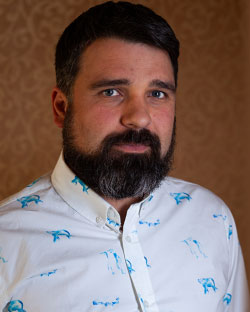15 July 2019
CEZ AGM goes to extra time but sheds little light on the fate of Pocerady coal power plant
By Jiří Jeřábek, Europe Beyond Coal campaign, minority shareholder of ČEZ
_______________________________________________________________________________
After a marathon 20-hour-long meeting that saw CEO Daniel Benes and his advisors bat away 400 shareholder questions and play down multiple climate activist interruptions, the 2019 AGM of Czech  state-owned energy company CEZ finally ground to a halt – yet nobody present was any the wiser regarding the potential sale of its most toxic coal plant, Pocerady.
state-owned energy company CEZ finally ground to a halt – yet nobody present was any the wiser regarding the potential sale of its most toxic coal plant, Pocerady.
Pocerady banned from the agenda as AGM is declared a ‘climate crime scene’
The day got off to an eventful start, with minority shareholders filing a request to add the controversial proposed sale of CEZ’s Pocerady (lignite) power plant to the meeting’s agenda, only to have their request thrown out by CEZ officials. Undeterred, they would go on to inundate CEO Daniel Benes and his team with a barrage of questions, many of them relating to the sale of Pocerady, but not before a cohort of activists from Greenpeace had successfully interrupted Mr. Benes’ opening speech [1]. Bearing banners emblazoned with ‘climate change starts here’ and declaring the meeting a ‘climate crime scene’, the activists successfully occupied the main hall and demanded that the company halt its plans to sell the Pocerady plant and close it down instead, before being ushered out, having managed to stall proceedings for approximately thirty minutes.
CEZ officials refuse to be drawn on Pocerady plans
The potential sale of the Pocerady (lignite) power plant to Czech coal tycoon Pavel Tykač is steeped in controversy. Tykač has had an agreement in place to purchase the facility for several years, should CEZ opt to sell [2]. Tykač’s Sev.en Energy has a track record of maximising the lifespan of old plants – a potential outcome that has already met strong resistance from Czech doctors, scientists and even former prime ministers and environmental ministers, who have called for the toxic plant to be closed [3]. Many of the minority shareholders – themselves concerned about the environmental and health impacts of a potential sale – took the opportunity to seek assurances from CEZ officials that the plant would not be sold and would instead be shut down. They were, however, left disappointed, as CEZ executives only confirmed that they are in the process of assessing the existing purchase option agreement between CEZ and Sev.en Energy, adding that the agreement is subject to a confidentiality clause and could therefore not be discussed publicly. Also critical of the purchase agreement were some of the other smaller shareholders – themselves united by their criticism of the muted purchase price of 2 billion CZK (77 mil Euro), which they regarded as too low.
CEZ officials concede CO2 emission reduction claims are misleading
Having endured the interruption in proceedings and batted away an avalanche of questioning around Pocerady, CEZ executives seemingly began to falter. Having announced that changes to the company’s business strategy (part of efforts to refocus CEZ’s business on the Czech Republic) would result in the sale of two of its Polish plants (Skawina and ELCHO), officials were quizzed as to whether the off-loading of the plants would be recorded as a reduction in CEZ’s own CO2 emissions [4]. Sheepishly, CEZ officials conceded that they would, despite being well aware that the plants will likely continue to operate under their new owners, deeming their climate impact unchanged. To make matters worse, the possible sale of the Pocerady power plant looks likely to result in the same outcome.
CEZ 2050 carbon-neutral strategy doesn’t stand up to scrutiny
CEZ CEO Daniel Benes reaffirmed CEZ’s commitment to being climate neutral in all electricity production by 2050 [5] without giving any details on the closure of a single power plant. Only after several well directed questions, did officials for the first time reveal concrete upcoming milestones: CEZ’s new lignite CHP unit at Mělník will be brought online in 2022; they plan to run unit Mělník I beyond 2030, and retrofitted blocks of its Prunéřov and Tušimice plants until 2035; and to only commit to closing the recently finished power plant at Ledvice (660 MW block) by 2050 at the latest.
It was put to CEZ officials that any serious carbon neutral strategy would necessitate an end to all expansion plans, commitments not to bring online any coal infrastructure currently under construction, and the closure, not sale, of existing assets by 2030 at the latest. CEZ officials ducked and dived, insisting that their plans were compatible with a 2050 carbon-neutral strategy and that the strategy wasn’t a classic example of greenwashing, despite its failure to engage with the goals of the UN Paris Climate Agreement.
CEZ bosses act like we have all the time in the world
After what felt like 20 hours of cross examination, the controversy and bewilderment surrounding the sale of Pocerady roles on, made worse by a seeming unwillingness on CEZ’s behalf to make the details of these discussions public. If CEZ truly wants to decarbonise, it needs to take responsibility for the coal fleet it actually has control over, rather than presenting cooked-up commitments that bear little or no relation to reality. In the real world, that would mean closing the plants it is currently formulating plans to sell. Anything less would indicate that CEZ is not actually serious when it comes to a coal exit.
—
Jiří Jeřábek, Europe Beyond Coal campaign, minority shareholder of ČEZ
- https://www.greenpeace.org/czech/tiskova-zprava/3687/dozens-of-protesters-interrupted-the-agm-of-cez-against-the-sale-of-coal-power-plant-pocerady/
- https://www.reuters.com/article/cez-pocerady-czechcoal-idUSL8N1IK2Q5
- http://www.hnutiduha.cz/aktualne/lekari-vedci-mistni-politici-i-byvali-premieri-ministri-vyzyvaji-vladu-cez-neprodavejte
- https://www.cez.cz/edee/content/file-s/pro-investory/investor-relations/vh2019_xp7cwys8w/aj/vh2019_08_aktualizace-koncepce-en.pdf)
- https://www.cez.cz/edee/content/file-s/pro-investory/investor-relations/vh2019_xp7cwys8w/aj/vh2019_01a_zprava-o-podnikatelske-cinnosti-en.pdf
